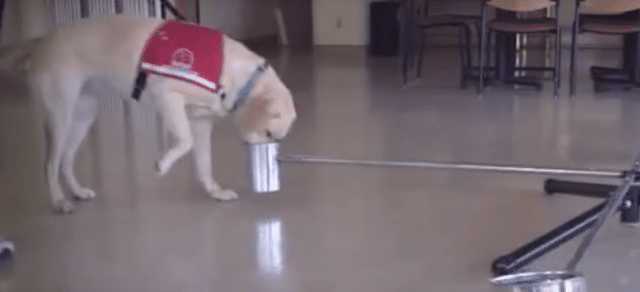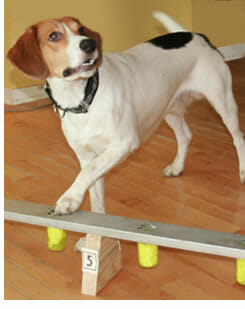Kilo the Pug probably won’t be winning any Barn Hunts, but he can still find hidden treats and has a much better sense of smell that me.

In our original documentary film, Talent Hounds, we explored the many evolving talents of dogs and sense of smell was a big one. Depending on the breed, a dog’s sense of smell may be approximately 10,000 to 100,000 times better than ours. They possess up to 300 million olfactory receptors in their noses compared to about five or six million in humans’ and the part of their brains that analyses and processes scents is proportionally much larger than ours. Dogs can detect some odours in parts per trillion.
See our post here for more details- Scent training- the dog’s amazing sense of smell.
Dogs have been used to sniff out many things including drugs, truffles, bombs, bodies, and diseases.
According to Psychology Today and other scientists, sick people often have an unusual scent and different illnesses have separate odors. Human bodies constantly give off a cocktail of chemicals known as volatile organic compounds (VOCs) in sweat, saliva, urine, breath and sebum that change when cells grow, as in the case of cancer, or when they die after being infected, for example, by a virus.
Medical Detection Dogs UK
We also spoke to people at Medical Detection Dogs in the UK for our documentary. They are at the forefront of the research into the fight against cancer, diabetes and other life-threatening diseases, including Parkinson’s disease and bacterial infections. Their Bio Detection Dogs are trained to find the odour of those diseases in samples such as urine, breath and sweat.
“A trained dog can actually scent the difference between a urine sample from somebody who does have a transitional cell carcinoma and one from someone who does not”. Dr Bruce Fogel.
They already apply what we know about the science of canine olfaction to benefit people by training Medical Alert Assistance Dogs to detect minute changes in an individual’s personal odour triggered by their disease and alert them to an impending medical event, helping them manage complex, life-threatening medical conditions and improving their quality of life.

Canadian Hero Dogs
In Canada, we followed the story of Nettle, an intelligent, young Yellow Labrador that helps care for 12-year-old twin girls Brooke and Jade, who suffer from two life-threatening conditions: Type 1 Diabetes and Celiac disease. Nettle is one of the first diabetic alert dogs to graduate from the Lions Foundation of Canada Dog Guides.

We also interviewed Cancer Detection Dogs in Canada (CancerDogs.ca) and saw their dogs being trained with treats and a clicker when they picked a positive sample.
Electronic Noses
Some research groups are working on electronic noses that can detect VOCs like dogs do. Electronic noses are expensive and take longer to develop. However, they won’t need the trained handlers that each dog does; they are scaleable, they can work 24/7; and their own health or that of their handler is not of concern, particularly when detecting a zoonotic disease like the novel coronavirus, which has already transferred from humans to some other mammals including dogs, cats and mink.
Can Dogs Detect COVID-19 Samples?
Canadian Research
Health Canada issued an RFI in November 2020 to find potential bidders who can conduct research to determine if there is a signature scent associated with COVID-19 then develop a safe training aid based on that scent to be used in a pilot program to train detector dogs (DDs), to assist in screening of incoming travellers for COVID-19 testing.
Some trainers apparently get the dogs curious in scent training initially by putting a small amount of dog food in the positive specimen.
US Research
According to the Washington Post, 9 dogs are enrolled in a study at the University of Pennsylvania School of Veterinary Medicine that is trying to find out if dogs can detect the smell of someone who has COVID-19. The dogs get rewarded for selecting a can of urine or other samples from a hospitalized coronavirus-positive patient over an array of alternatives.
This is a key step in a training process that may one day allow dogs to pick out infected individuals, including those who are asymptomatic, in nursing homes, businesses and airports, potentially screening as many as 250 people an hour. The downside is that training the dogs is expensive and difficult to scale.
French Research
Dominique Grandjean, a professor at the national veterinary school of Alfort in France and head of an international research team, began training dogs to alert on the coronavirus in France in March 2020 and was surpised at the success. He just completed a proof-of-concept study published in December 2020. They trained six dogs for one to three weeks to detect the smell of patients with symptomatic novel coronavirus. Researchers took sweat samples from 177 people, just over half of whom were COVID-19 positive. Once trained, the dog had to mark the COVID-19 positive sample randomly placed behind one of three or four olfactory cones (the other cones contained at least one COVID-19 negative sample and between zero and two mocks). The dogs and handlers were blinded to the COVID-positive sample location. The dogs with the least amount of training picked out the COVID-19 samples more than 76 per cent of the time. Two dogs already trained to sniff out cancer had a perfect record in the study, detecting COVID-19 in the samples 100 per cent of the time extremely quickly. More studies are underway to see if dogs can detect COVID-19 through saliva and urine samples.
What Airports are Using These dogs?
Dogs are being trained to sniff out COVID-19 in several countries at airports already.
Dubai Airport
Dogs went to work sniffing swabs of passengers’ armpit sweat at the first, Dubai, UAE airport, in mid-August, 2020. About 10 percent of arriving passengers are picked at random for the testing. Upon entering the testing area, the passenger’s skin is swiped by medical professionals. This swiped sample is what the dog will sniff in a separate space, similar to the way the Penn animals are working. Depending on how the dog was trained he will either give a positive or negative response. These include laying down, scratching a paw or barking. The Dubai dogs reportedly are about 94.5 percent accurate.
Helsinki Airport
There is also a pilot program at Helsinki airport sponsored by the government. Scientists there apparently reported that COVID-19 is quite an easy smell for these dogs to detect and success rates are good. Some have even done so in under seven minutes.
Other Countries
Other countries, including Australia and Belgium have also apparently already started putting virus-sniffing dogs to work. One Russian airline company is also reportedly using dogs to sniff passengers before they board flights.

I 100% believe it. My dog detected by COVID several days before my at-home test would come back positive.